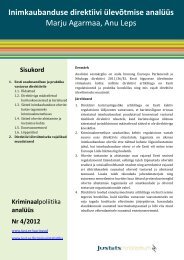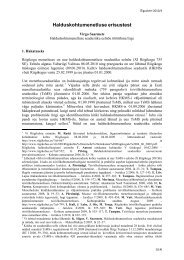Kannatanu kriminaalmenetluses - Justiitsministeerium
Kannatanu kriminaalmenetluses - Justiitsministeerium
Kannatanu kriminaalmenetluses - Justiitsministeerium
You also want an ePaper? Increase the reach of your titles
YUMPU automatically turns print PDFs into web optimized ePapers that Google loves.
Summary<br />
Victim in criminal proceedings<br />
Nowadays the state has the exclusive right to punish criminals. Therefore it must conduct<br />
criminal procedure according to law. The state has to consider and protect the accused’s rights<br />
but there has been less concern about protecting the crime victim’s rights.<br />
Many common law jurists have developed different theories about criminal procedure. For<br />
example, professor H. L. Packer created two models of criminal procedure, the crime control<br />
model and the due process model – none of which consider the rights of the victim. Many<br />
years later K. Roach and D. E. Beloof realised that the existing theoretical models no longer<br />
explain different procedures and decisions made within the criminal justice system. They<br />
developed new models that also recognise the victim as a participant in criminal proceedings.<br />
The new models have roots in both the restorative justice theory and in the retributive justice<br />
theory or theory of punishment. In the year of 2008 J. W. Stickels believed that the attempt to<br />
satisfy the victim’s interests has become the primary value of the criminal justice system.<br />
There has been a lot of debate whether and how to include the victim in criminal proceedings.<br />
Some think victims are too emotional, do not have necessary knowledge and are useless.<br />
Victims’ supporters on the contrary say that it is fair to give victims the right to participate.<br />
Some even believe that the victim and the accused should have equal rights.<br />
The victim could have many functions. He can just be a complainer or a witness. In the<br />
inquisitorial system he can participate as a private party and file a civil action. Many courts<br />
propose that a victim can receive a compensation from the accused in a civil matter. But<br />
usually this is not an option for the victim. Filing a civil action is different from a criminal<br />
matter in its quality. In some jurisdictions it is possible for the victim to act as a private<br />
prosecutor or a substitute prosecutor.<br />
When a victim does not have an autonomous role in criminal proceedings, one may wonder if<br />
the prosecutor as a representative of the state has also the duty to represent and stand for the<br />
interests of the victim. This kind of relationship resembles a client-lawyer relationship. It may<br />
be difficult, if not impossible for the client-lawyer relationship to function because the<br />
prosecutor and the victim may dissent on different issues.<br />
54

















